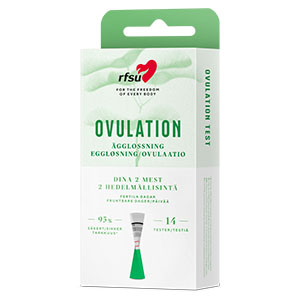Pregnancy calendar – calculate pregnancy week and EDD
Want to find out what week of pregnancy you are in or get an estimated due date (EDD)? With our pregnancy calendar, you can quickly calculate how far along you are in your pregnancy and when your baby is expected to be born. Enter the date of your last period - the calendar is based on an average cycle of 28 days.
What pregnancy week are you in?
To calculate which week of pregnancy you are in, you need to know the start day of your last period. That day counts as the first day of pregnancy, even if you are not actually pregnant yet. From there you count the weeks that follow. Use our pregnancy calendar – it’s easy and quick!

Pregnancy calendar
You can calculate which week of pregnancy you or your partner are in and get an approximate date of birth. Fill in the date of the last menstrual period and click “Calculate”. The calendar is based on an average menstrual cycle of 28 days.
You are in week:
Estimated birth date:
*NB! These calculations are based on certain assumptions and may not be accurate specifically for you.
How does a pregnancy calendar work?
Pregnancy weeks are counted from the first day of the last menstrual period, although fertilisation usually takes place about two weeks later. This means that you are technically considered pregnant even before the egg is actually fertilised. The calendar helps you keep track of each week of pregnancy and how far along you are.
Having a clear overview can be very helpful in following the development of the foetus week by week. By calculating the gestational weeks, you can also get an idea of when in your pregnancy it is time for various examinations and check-ups.
What is the estimated date of labour (EDL)?
The estimated date of delivery, often abbreviated as EDD, is the date on which the baby is expected to be born according to the calendar. It is based on the first day of your last period and an average pregnancy of 40 weeks. As ovulation and fertilisation occur at different times in different people, the The estimated date of delivery, often abbreviated as EDD, is the date on which the baby is expected to be born according to the calendar. It is based on the first day of your last period and an average pregnancy of 40 weeks. As ovulation and fertilisation occur at different times in different people, the EDD is always an approximate date. is always an approximate date.
Most babies are not born exactly on their estimated date, but sometime between weeks 37 and 42. The EDD is mainly used as a benchmark for planning health care visits and monitoring the progress of the pregnancy.
How reliable is a pregnancy calendar?
A pregnancy calendar gives an approximate answer based on when your last period started and an average menstrual cycle of 28 days. It’s a simple and practical method to calculate the week of pregnancy and the estimated date of delivery (EDD). However, as all cycles are different and ovulation can occur earlier or later, it is not an exact science.
To get a more accurate date, ultrasound is often used in early pregnancy. It adjusts the week and EDD based on the size of the foetus. So the calendar is a good first estimate, but the healthcare provider may adjust the date later in the pregnancy.
How many weeks pregnant are you?
A full-term pregnancy is usually around 40 weeks, or 280 days, from the first day of your last period. It is important to remember that the length of pregnancy can vary slightly from person to person. Some give birth a few weeks before their due date, others a few days after. But regardless of when the baby decides to arrive, the pregnancy calendar is a good support to follow the development and keep track of where you are in your pregnancy.
What does week 19+3 mean?
Week 19+3 means that 19 full weeks of pregnancy have passed and you are on the fourth day of week 20. In healthcare, weeks of pregnancy are always counted in this way – whole weeks plus days into the current week. So, for example, if you are in week 19+3, 136 days have passed since the first day of pregnancy (counting from the first day of your last period). Many expectant parents say they are in week 20 instead.
Source: www.1177.se fact-checked by the RFSU clinic














